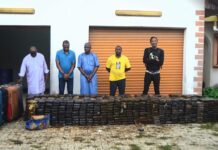UN Population Fund (UNFPA) says Women and Girls Safe Space (WGSS) is key to restoring confidence, hope and building network among the female gender in the North East.
The fund’s Media Associate, Hajiya Kori Habib, said this in a statement to the News Agency of Nigeria (NAN) in Abuja on Wednesday.
Habib, who said that the WGSS was an avenue for reunion and interaction aimed at rebuilding lost confidence, added that “Women and Girls Safe Space provides a platform through which women and girls meet daily.
“It is a place safe enough for women and girls to make friends, have fun, discuss their concerns and needs.
“It is also an environment conducive enough to acquire skills and get information on various issues such as Gender Based Violence (GBV), HIV/AIDS, reproductive health, hygiene and sanitation.”
The media associate reiterated the commitment of the UN organ to protect women and girls, saying that safe space, created in many states for women and girls to freely express their minds and exchange ideas on things peculiar to them, were operated between 8 a.m. to 4 p.m. through weekdays.
She noted that “UNFPA trained and deployed GBV and Sexual Reproductive Health frontlines to such places through ministry of women affairs and social development to ensure sustainability, managed with strict compliance to COVID-19 protocols.
“During these sessions, general information on GBV, SRH, HIV/AIDS, Sexually Transmitted Infections (STIs) and menstrual hygiene are provided to the women and girls.
“The team comprises of two frontline psychosocial support counselors who conduct group sessions with up to 60 participants per week.
“On average, around 160 people are reached in these sessions in safe space per month.”
Habib explained that information dissemination was carried out by community mobilisers who give GBV-related information through house-to-house visits.
According to her, the information dissemination sessions focus on types of GBV and the importance of seeking timely care, as well as existing referral pathways. (NAN)




